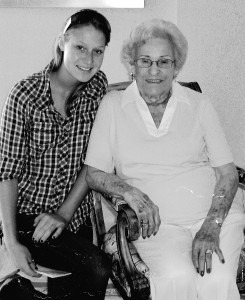
With the help of the University of Miami’s Judaic Studies Program, students can adopt a grandparent and learn more about the Holocaust at the same time.
The Holocaust Survivors Service Internship is a two-semester program through which students earn three credits per semester for spending one hour a week, or two hours every other week, with a survivor.
“It transitions from an internship course into a straight relationship,” alumna Mary Yoachim said. “I refer to her as my adopted grandmother.”
Yoachim began the program during fall 2010 and was paired with 86-year-old Mala D., whose full name cannot be disclosed, from Lodz, Poland. Yoachim, whose grandparents are deceased, has no personal connection with the Holocaust, but said that meeting Mala D. has made her a more conscious person.
“It has brought the perspective of having an older person back in my life,” Yoachim said. “I ask myself what she would do in various situations. She reminds me that you have to be patient.”
Aside from meeting with a survivor, for which students are eligible for a $500 stipend to cover travel costs, students can attend an enrichment session every other week for one day a week to view films, hear lectures and have discussions. To get credit for the internship, students must accumulate a certain number of credits that are determined by the amount of times they have met with their survivor, gone to the enrichment session or met with a faculty advisor.
At the end of the first semester, students must write a synopsis or timeline of the survivor’s life, write them a thank you letter and print out a large black-and-white photo of the student and the survivor. For the second semester, students must complete a legacy project, such as a scrapbook, a cookbook or a commemorative item, that can be a reflection of the pair’s relationship.
Students are matched with survivors based on their interests and background by Jewish Community Services, an organization that interviews students and survivors. Alumna Vanessa Mander was paired with 81-year-old Bianca Lerner from Warsaw, Poland who has lived in Miami for the last 25 years.
“Everyone has different experiences with their survivors,” Mander said. “The first time we met she hit me with her entire Holocaust story. It was the most intense experience. But after, it felt like we became best friends.”
The credits for the internship can count for either Judaic studies or religious studies as JUS 205 and REL 406, respectively.
The program is not limited to students majoring in Judaic studies or those with a Jewish background. Eugene Rothman, internship coordinator and associate director for academic development at the Miller Center for Contemporary Judaic Studies, predicts the program will last another three to four years, since the survivors are growing older.
“It is a unique opportunity for students, but one they have to take advantage of quickly,” Rothman said.






